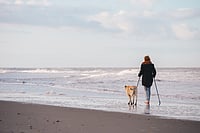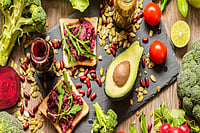We are in the middle of a drastic climate change—rainforest destruction, scarcity of clean drinking water, increasing greenhouse gases in the atmosphere, and extreme weather changes. Although a lot of discussions have centred on the usual suspects—fossil fuels, industrial units, refineries, and transport—world leaders often stop short of discussing other important contributors such as increased use of antimicrobials and pesticides, animal farming, our choice of diets and lifestyle, etc. The Covid-19 pandemic has forced us to see the disastrous path that we are on with our relentless consumption, exploitation of natural habitats, and our lack of will to take action. And, now humanity has an urgency, unlike any before, to address this reality.
As we step into the Decade on Ecosystem Restoration 2021-2030 instituted by the United Nations to prevent, halt and reverse the degradation of ecosystems worldwide, this piece intends to highlight how animal agriculture and consumption impacts our air, water, biodiversity and wildlife.
Air
The concentration of greenhouse gases in the atmosphere is now the highest in human history. According to the Food and Agriculture Organisation (FAO), a whopping 14.5% of all human-induced greenhouse gases come from global livestock. Of this, cattle (raised for meat and milk) produce 65% of the emissions.
While critics say that these warnings cannot be held for a country like India where the meat consumption per person is low, data shows that India ranks first in cattle population. Our livestock stands at nearly 520 million in number making India one of the largest cattle milk producers in the world. The December 2018 report submitted by the Ministry of Environment, Forests and Climate Change accounts that together, this livestock produces more greenhouses gases than produced by cars, trucks, and motorbike combined annually. For instance, the amount of greenhouses emissions produced by livestock also surpassed the carbon emissions of the oil-producing United Arab Emirates last year. As a result, India is the world’s fifth-largest emitter of greenhouse gases.
But the problem doesn’t end here. Microbial breakdown of industrial farm waste releases nitrogen and organic carbon compounds polluting the air we breathe in. Gases including carbon dioxide, hydrogen sulphide, ammonia, and methane cause respiratory tract and nervous system illnesses in both animals and humans.
Water
Water is a fundamental human right and at the centre of sustainable development. Did you know that nearly 2 billion people are living with high water stress? Or that 80 per cent of the wastewater flows back into the ecosystem without being treated? With climate change, more areas around the world will experience natural disasters that are weather-related such as drought-like conditions and floods.
Let us also look at the disproportionate use of water in an industry like animal farming. Animal farming is heavily dependent on water. Where one kilogram of wheat requires approximately 2,100 litres of water, it requires about 5,218 litres of water to produce one kilogram of pig meat. Shocking still is the amount of water required to produce one kilogram of Indian chicken meat and bovine meat respectively—8,367 and 16,547 litres of water. For comparison, this is as much water as an average Indian household uses in four months.
But meat production is not the only contributor. The milk industry has a similar trajectory when it comes to water use. The demand for dairy became an all-time high following the White Revolution, increasing the supply. India is the largest consumer of milk and the consumption has jumped by 63% between 2007 and 2017. One litre of milk production along with its allied activities (animal feed, cleaning, packaging, and transportation) requires about 1020 litres of water. The story is similar for poultry-related production where there is similar or worse water wastage. Animal agriculture does not only take away water sources, it actively pollutes clean water. The waste generated by these industries pollute water bodies and deplete our sources of fresh and groundwater.
Biodiversity and Wildlife
The loss of biodiversity, wild areas, forests, and the extinction of wildlife has a significant correlation with farm and industrial activities. The clearing of forests and grasslands, production of chemical fertilizers, use of fossil fuel-dependent transport, and excessive food waste further the magnitude of the climate crisis. New research shows that meat and dairy production uses 83% of farmland; and that, 86% of all land animals are either humans or livestock. Research also indicates that with a small change in our lifestyle, we will be able to reduce global farmland by more than 75%, and still feed the world. This area would be equivalent to the US, China, Europe, and Australia combined.
So there we have it, a solution, that is immediate and within reach.
We need to reduce our consumption and wastage by adopting a sustainable lifestyle—eating greener, eliminating plastic, recycling, and controlling water wastage. By doing this, even gradually reducing our intake of animal products, we can significantly slow down climate change. You might question whether recycling newspaper or using a paper straw really affects the grander scheme of things. But consider this: by turning off the water while brushing your teeth, you can save 100 ml of water; by switching to plant-based alternatives, you can save thousands of litres of water. Similarly, a single household giving up meat and dairy may not be the fastest solution to addressing climate change, but it certainly is a good place to start.
Global change is nothing but a significant personal change. So, this New Year, even as we are trying to protect ourselves and our loved ones from the pandemic, can we take a step further? Can we tackle our consumption, which is based on ingrained habits and pleasures? Can we adopt a sustainable lifestyle to save our planet?
(The author is the Executive Director of the Federation of Indian Animal Protection Organisations, India’s apex animal protection organization. Views expressed are personal)

























